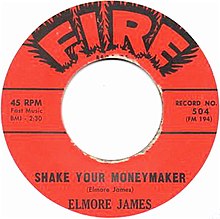Shake Your Moneymaker (song)
| "Shake Your Moneymaker" | ||||
|---|---|---|---|---|
 | ||||
| Single by Elmore James | ||||
| A-side | "Look on Yonder Wall" | |||
| Released | December 1961 | |||
| Recorded | June–September 1961 | |||
| Studio | J&M Studios, New Orleans, Louisiana | |||
| Genre | Blues | |||
| Length | 2:30 | |||
| Label | Fire | |||
| Songwriter(s) | Elmore James | |||
| Producer(s) | Bobby Robinson | |||
| Elmore James singles chronology | ||||
| ||||
"Shake Your Moneymaker" or "Shake Your Money Maker" is a song recorded by Elmore James in 1961 that has become a blues standard.[1] Inspired by earlier songs, it has been interpreted and recorded by several blues and other artists.
"Shake Your Moneymaker" is included on the Rock and Roll Hall of Fame's list of the "500 Songs that Shaped Rock and Roll" and in 2019, the Blues Foundation inducted it into the Blues Hall of Fame as a "Classic of Blues Recording".
Earlier songs[]
In 1958, Chicago blues singer and harmonica player Shakey Jake Harris recorded "Roll Your Moneymaker" with a band including Magic Sam on guitar and Willie Dixon on bass.[2] The song, a twelve-bar blues with breaks, featured the chorus "roll your moneymaker". Elmore James biographer Steve Franz notes, "Chicago blues lore [has it that] drummer/vocalist James Bannister was the author of a tune known as 'Roll Your Moneymaker', but never recorded it" (Bannister had played with J. T. Brown and Magic Sam).[3] He adds that the rhythm guitar figure in James' "Shake Your Moneymaker" was inspired by "Got the Blues Can't Be Satisfied", recorded by Mississippi John Hurt in 1928.[4][3]
Blues historian Gerard Herzhaft suggests that "Shake Your Moneymaker" is a variation on songs that have been traced back to Charlie Patton (1929 "Shake It and Break It"[5]) and Bukka White (1937 "Shake 'Em on Down"[6]).[1] However, the song has been also identified as an Elmore James "original".[7]
Elmore James song[]
"Shake Your Moneymaker" is an up-tempo twelve-bar blues featuring slide guitar. James frequently repeats the phrase "shake your money maker" throughout the song, but provides little context for the lyrics. The tune became one of James' most well-known songs and a popular dance number. Activist and author James Meredith described witnessing James "working the crowd into a frenzy at Mr. P's, a humble Mississippi juke joint" with the song.[8] Franz adds "Sometimes the band would play it for thirty minutes or longer without stopping, and the crowd would continue to beg for more when it was over".[3]
James recorded the song at Cosimo Matassa's J&M Studios in New Orleans, Louisiana during a "candlelight" or non-union session in the summer of 1961.[3] According to drummer and harp player Sam Myers, James was having problems with the union, so the session took place at night with the lights dimmed so as not to attract the attention of the musician's local.[3] James had assembled a Mississippi version of his backing band, the Broomdusters, for the recordings: Johnny "Big Moose" Walker on piano, Sammy Lee Bully on bass, and King Mose Taylor on drums. After one false start, the second take provided the master used for the single. Although several songs were recorded during the session, only "Shake Your Moneymaker", together with "Look on Yonder Wall", was released at the time.
Recognition and legacy[]
The Rock and Roll Hall of Fame included "Shake Your Moneymaker" on its list of the "500 Songs that Shaped Rock and Roll".[9] In 2019, the Blues Foundation inducted "Shake Your Moneymaker" into the Blues Hall of Fame as a "Classic of Blues Recording". The induction statement describes it as "an exuberant, uptempo departure from slide guitar master Elmore James' deep blues recordings" and notes its popularity among rock musicians, including Fleetwood Mac (1968, Fleetwood Mac), George Thorogood (1988, Born to Be Bad), the Black Crowes with Jimmy Page (1999, Live at the Greek), and Rod Stewart (2013, Time).[10]
Notes[]
- ^ Jump up to: a b Herzhaft, Gerard (1992). "Shake Your Moneymaker". Encyclopedia of the Blues. Fayetteville, Arkansas: University of Arkansas Press. p. 470. ISBN 1-55728-252-8.
- ^ Artistic Records 1502
- ^ Jump up to: a b c d e Franz, Steve (2003). The Amazing Secret History of Elmore James. Walsworth Publishing. pp. 115–17. ISBN 0-9718038-1-1.
- ^ OKeh Records 8724
- ^ Paramount Records 12869
- ^ Vocalion Records 03711
- ^ Morris, Chris; Haig, Diana (1992). Elmore James: King of the Slide Guitar (Box set booklet). Elmore James. Nashville, Tennessee: Capricorn Records. p. 13. 9 42006–2.
- ^ Gioia, Ted (2008). Delta Blues (Norton Paperback 2009 ed.). New York City: W. W. Norton. p. 314. ISBN 978-0-393-33750-1.
- ^ "500 Songs That Shaped Rock and Roll". Rock and Roll Hall of Fame. 1995. Archived from the original on May 2, 2007. Retrieved March 4, 2011.
- ^ Blues Foundation. "2019 Hall of Fame Inductees: "Shake Your Moneymaker" – Elmore James (Fire, 1961)". The Blues Foundation. Retrieved May 8, 2019.
- 1961 songs
- 1961 singles
- Elmore James songs
- Blues songs
- Songs written by Elmore James
- Songs about sexuality
- Songs about buttocks